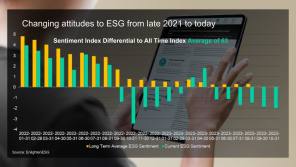Considering environmental, social and governance factors when investing is nothing new.
Back in the 1800s, Methodists and Quakers were already firmly against investment in weapons, alcohol, tobacco or slave trading.
Nowadays, responsible investment has a much broader appeal, which has extended well beyond religious beliefs. Investment Association figures published on November 5 show that investors are pouring money into ethical funds.
As IA chief executive, Chris Cummings, reports: “The year so far has seen record investment into responsible investment funds, with more than £7bn invested into funds which consider their wider impact on the world.”
This is well up from the £1.9bn recorded for the first three-quarters of 2019.

The year so far has seen record investment into responsible investment funds, with more than £7bn invested into these funds
Chris Cummings, Investment AssociationESG investment is, however, still a relatively new topic for some advisers, whereas others are already experienced in this area, as Jeannie Boyle, executive director and chartered financial planner at EQ Investors, says: “We’ve been looking at how money can have a positive impact for clients and on the environment for the past decade or so.”
Regardless of their experience level, advisers will be required to have conversations with their clients about their ESG preferences soon.
Key Points
- Advisers now have to have conversations with clients about ESG investing.
- They can outsource some decisions to DFMs.
- Rating agencies can also help.
Following Mifid II, new rules will require financial advice companies to comply with the EU’s sustainable finance action plan.
It will be mandatory for companies to include questions on ESG investing as part of the suitability process, starting from 2021, and to have a system in place for clients wishing to invest in sustainable products.
This is viewed as a step in the right direction by Thomas Tayler, senior manager, Sustainable Finance Centre for Excellence at Aviva Investors, who says: “Ensuring that customers’ sustainability preferences are a mandatory part of the financial advice suitability process is an essential change that we warmly welcome.”
Some are less enthused by the new rule, however, according to Elizabeth Stuart, analyst – sustainability research at fund ratings agency Morningstar: “I’ve been on a few adviser forum panels and the feedback from some advisers is that this has been foisted on them and they don’t know what to ask or what to do with the answers.”
Such concerns about knowledge and implementation are echoed in recent research by Aviva Investors, which revealed that nearly half (45 per cent) of all advisers surveyed had had no training in ESG.
Adviser options – and the pitfalls to avoid









.jpg)


